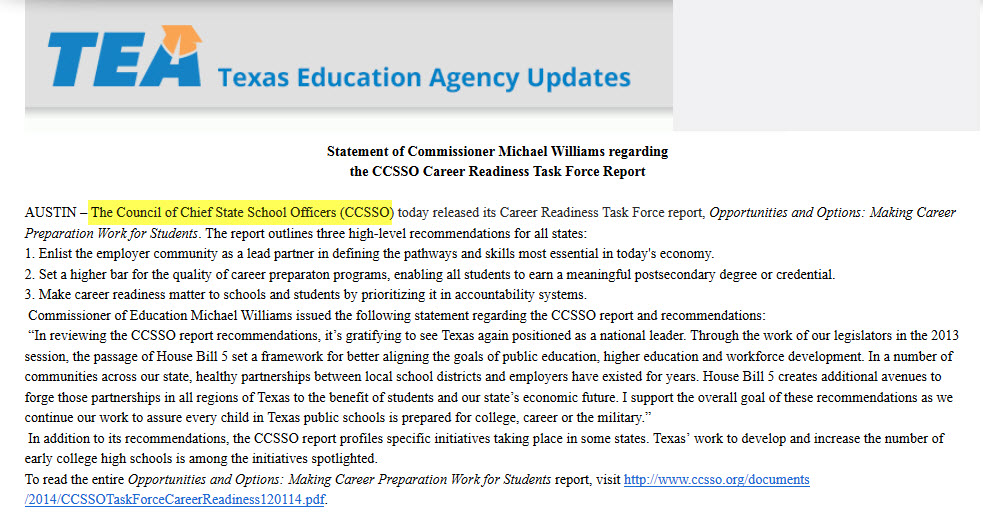
CSCOPE: HOW DID TEXAS GET IT HERE?
By Danette Clark
In 1992, the Texas Education Agency (TEA) entered into a partnership with Texas Industrial Areas Foundation (IAF) and Austin Interfaith to direct funds to low-performing schools for use in teacher training, parent leadership training, and after-school enrichment. From this partnership, several IAF ‘Alliance Schools’ were created.
Texas IAF is part of the Saul Alinsky-founded and Chicago-based Industrial Areas Foundation. Saul Alinsky is the Marx-loving, God-hating community organizer known for his influence on President Obama and ACORN.
According to a 2009 study by the Annenberg Institute, Texas IAF’s Alliance Schools network grew to ”roughly a quarter of the Austin Independent School District’s elementary schools and half of the district’s high-poverty schools” in an eight-year period.
The study also reveals that Texas IAF and Austin Interfaith developed a collaborative relationship with former Austin ISD Superintendent, Pascal Forgione.
The Alliance Schools model can now be found in approximately 160 schools throughout the state – a speck on the map when compared to the number of Texas schools infected by the Coalition of Essential Schools.
As I wrote in Unravelled! The 30 Year Agenda Behind Common Core, the Coalition of Essential Schools (CES) is the radical reform movement behind both CSCOPE and Common Core.
CES, which is modeled after secularist reformers like John Dewey, Jean Piaget, Paulo Freire, and George Counts, functions as a communist-style education movement with the stated intent of ‘educating for a more democratic and just society’.
Westbury High School in Houston and R.L. Paschal High School in Fort Worth are two of the original twelve schools that were established (or ‘redesigned’) by Theodore Sizer in 1984 to become CES member schools.
According to StateUniversity.com, the R.L. Paschal Essential School, which is a small autonomous unit embedded within the larger Paschal High School, survived and flourished by “keeping a very low profile“.
The largest expansion of CES progressive reform in Texas came years later by way of the Houston Annenberg Challenge.
In 1993, then President Bill Clinton announced that Ambassador Walter Annenberg would donate 500 million dollars to improving public schools in America. It was this 500 million, plus matching grants from private sources, that aided in the nationwide expansion of Theodore Sizer’s Coalition of Essential Schools.
Through the Annenberg grant, communist and domestic terrorist Bill Ayers created the Chicago Annenberg Challenge, wherein he and Barack Obama served on the board to further expand CES schools in the State of Illinois.
Both Ayers and President Obama have continued to this day to do their respective parts to promote and expanded CES schools nationwide. Ayers’ Small Schools Workshop still aids schools and districts across the country in implementing progressive reform through smaller learning community grants and funding from sources like the Bill and Melinda Gates Foundation, Brown University, and the Annenberg Institute.
In addition to the well known Chicago Annenberg Challenge, Walter Annenberg’s ‘Challenge to the Nation‘ also provided for the expansion of progressive reform to Boston, Detroit, Los Angeles, New York City, Philadelphia, the San Francisco Bay area, South Florida, and Houston.
In Houston, it was the Brown Foundation, Houston Endowment Incorporated, and several corporate and business leaders who collaborated to apply for a piece of the challenge grant money being offered by Annenberg.
Delia Quintanilla served as the first director of the Houston Annenberg Challenge (HAC). Six local universities were called on to provide support to the HAC by providing university staff, faculty, and students to interact with districts and aid in implementing reform.
The Annenberg Institute kicked off the HAC by choosing eleven ‘Beacon Schools’ to “‘light the way‘ to quality school reform for other funded schools”.
According to Chester Finn, Jr. of the Thomas B. Fordham Institute, the Beacon Schools chosen appeared to have been ’cherry picked’. Finn reported that the eleven schools chosen by Annenberg were doing better than the Houston average when they entered the program and were performing at about the same level three years later. Therefore, although it may have appeared to outsiders that the first few years of reform in those eleven schools was effective, as Finn stated, he could “scarcely tell what was caused by Annenberg and what may have been shaped by other influences”.
In 1995, Humble Independent School District opened Quest Early College High School. Quest is an Annenberg Challenge Grant Beacon School, a First Amendment School and a Coalition of Essential Schools Mentor School.
CES mentor schools act as a model of reform for others schools, offering school study tours, advocacy training, legislative action sessions, and professional development opportunities.
A Houston Annenberg Challenge 2 year summary report revealed that by 2001, approximately 100 metropolitan schools had already introduced Critical Friends groups on their campuses and the HAC had trained 300 coaches in both Annenberg-funded and non-Annenberg-funded schools.
The report further revealed that promising teachers and curriculum trainers were identified through group collaborations. Specifically:
“Teachers from Annenberg schools collaborate actively in Critical Friends Groups, Literature Study Circles, Professional Academies, Teacher Writing Groups, and Teacher Action Research Teams. From these activities expert teachers emerge as peer leaders in roles such as Critical Friends Group Coaches, Content Specialists, and Reading Learning Facilitators. Furthermore, a number of teachers have become certified as curriculum trainers in national programs including the Coalition of Essential Schools and the New Jersey Writing Project.”
Just as educators were identified and chosen through these collaborative efforts, some were also identified as not worthy to continue their involvement in the progressive reform process.
According to an article printed by the Houston Press in 1998, director Delia Quintanilla was dismissed a little more than a year after the Houston Annenberg Challenge got off the ground, and a troubleshooting team from the Annenberg Institute was being sent to Houston to “evaluate and audit the effectiveness of the local administration of the grant”.
Annenberg Challenge National Coordinator, Barbara Cervone, expressed “serious concerns about the leadership, coherence and pace of the Annenberg effort in Houston”.
Despite tensions between proponents of CES’s radical reform methods, HAC pressed on with strict oversight and instruction from the Annenberg Institute and further donations from ‘philanthropic’ organizations, including the Bill and Melinda Gates Foundation and Carnegie Corporation.
Annenberg established the New Visions in Leadership Academy to train like-minded radicals for placement as principles into Texas Annenberg/CES schools. According to this job posting, “more than 300 seated school leaders from Houston-area K-12 districts” graduated from New Visions in the first 10 years.
In 2002, Humble ISD passed a $230,000,000 bond measure to build Atascocita and Kingwood Park High Schools and redesign existing elementary, middle, and high schools.
Cecilia Hawkins, who served as the principal of Quest Early College High School for four years, left her position at Quest to work with community organizations in an effort to expand district reform.
From CES’s website (2005):
“Inspired by its experience with the Coalition of Essential Schools and the Houston Annenberg Challenge (now the Houston A+ Challenge) through Quest High School… Humble has not only put into place a process to remake its high schools but it has reorganized its entire district…”.
What has come as a surprise to many involved in exposing CSCOPE is the fact that several principals and superintendents seem to have no problem with the Anti-American content, errors, and ’fuzzy math’ found in CSCOPE lessons.
Understandably, it must be difficult to accept that there could be that many radical educators in a state like Texas, willing to break the law and deceive children and parents for profit or to advance a political agenda.
The fact is, Texas is a big state with several universities; and universities, for the most part, have often been a refuge and breeding ground for radicals.
CES schools have always relied heavily on the school-university partnership to implement and advance K-12 reform. ‘Professional development schools‘ are often created wherein universities and schools collaborate to ”prepare new teachers, to renew the professional knowledge of veteran teachers, and to conduct site-based research into teaching and learning”.
In many states, CES has infiltrated and affected university course offerings for up and coming teachers, principals, and superintendents.
For example, Sam Houston University, as a requirement for superintendent certification, offers an internship course led by Dr. Shirley Johnson. Johnson is the executive director of Texas Coalition of Essential Schools.
According to Johnson’s course syllabus and guidelines, all interns must complete a “Leadership Profile”, the cost of which is to be paid by the student directly to Texas CES. Students are then given the opportunity to attend a feedback session related to the leadership profile — no doubt to allow the instructor to gauge whether the student would be a productive leader in a CES-style school.
Several other avenues exist for identifying prospective radical educators for placement in these indoctrination centers. Texas ASCD, for example, who partners with CES and actively promotes and expands CES reform, identifies, recruits, and trains teachers and curriculum leaders, many of whom are identified in collaboration with local universities.
Read about the connections between Texas ASCD and educators behind CSCOPE and Common Core here and here.
CSCOPE is Common Core
In January of 2010, Governor Rick Perry formally rejected the nationally proposed Common Core State Standards, stating that he would not “commit Texas taxpayers to unfunded federal obligations or to the adoption of unproven, cost-prohibitive national standards and tests”.
Ironically, the very people behind Common Core were already actively working within Perry’s state and had been for many years.
Linda Darling Hammond, one of several radical educators behind the design of CSCOPE, has worked with Texas schools for years through her organization, School Redesign Network.
Achieve, Inc., an organization that has aided in authoring the Common Core standards, launched the American Diploma Project in 2005. Texas was one of 13 states to join the America Diploma Project Network.
As I wrote here, Achieve, Inc. is not only made up of several Coalition of Essential Schools/Annenberg reformers, but it was literally created by leaders of the National Governors Association and the Annenberg Institute.
The Grow Network (now owned by McGraw-Hill) was founded by David Coleman, who is said to be ’the architect’ of Common Core. In 2004, the Texas Education Agency entered into a four-year, 17.7 million dollar contract with Grow Network for online Personalized Study Guides to be provided to Texas educators and students.
Considering many of the same educators behind CSCOPE are also behind Common Core, and considering the rumor that Common Core offered to purchase the CSCOPE program for use with the national standards; it appears that CSCOPE was a ‘test-run’ for Common Core.
It seems likely that Texas is the guinea pig and CSCOPE a pilot project –being tested before going all in and using it with Common Core standards in more than 45 states.
It can’t be a coincidence that the same educators behind Common Core just-so-happened to have been chosen to contribute to the design of CSCOPE. Those educators, Wiggins, Tighe, Hammond, Jacobs, and others, have spent years providing professional development to Texas educators over, and over, and over on how to use their designs and teaching strategies, the same designs they are teaching Common Core states to use with Common Core standards.
Here’s an interesting side-note – Although it has been more than three years since Texas rejected Common Core, former Austin ISD Superintendent Pascal Forgione, the same superintendent who has worked hand-in-hand with Alinsky’s IAF and Linda Darling Hammond’s School Redesign Network, is participating in a conference later this year inAustin to discuss Common Core.
Forgione is now executive director of Educational Testing Service’s K-12 Center located in Austin.
K-12 Center works in partnership with the CCSSO and other organizations to develop Common Core assessment systems and also partners with the Alliance for Excellent Education, where Linda Darling Hammond serves on the board.
The conference on Common Core, in which Forgione will be the keynote speaker, is scheduled to take place August 12th-14th in Austin.
Did Forgione not get the memo that Texas rejected Common Core, or does he know something that we don’t?




